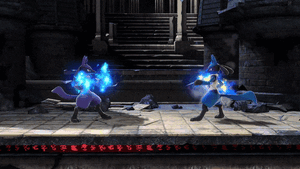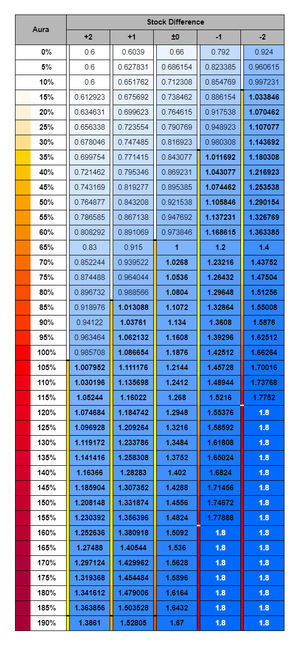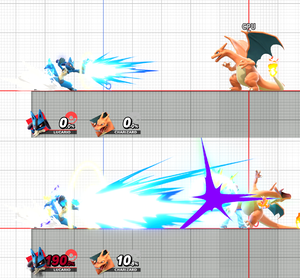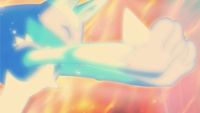Aura

Aura (Japanese: 波導 wave-guiding) is Lucario's fighter ability throughout all its appearances in the Super Smash Bros. series, starting in Super Smash Bros. Brawl. It modifies the damage and knockback of Lucario's moves based on its current damage percentage, weakening them at low percents and strengthening them at high percents. The aura mechanic only applies to Lucario, even if another character uses an attack with the aura effect (including Kirby if he copies Aura Sphere), and starting in Super Smash Bros. 4, applies to all of Lucario's attacks regardless of whether or not they have the aura effect.
General properties
The functionality of Lucario's Aura is determined by various factors. It has three main stages decided by specific damage percents; a floor percent, a baseline percent, and a ceiling percent, each with a specific damage multiplier that applies to Lucario's attacks. For example, in Brawl, the floor percent is 20% with a damage multiplier of 0.7×, then the baseline percent is 75% with a multiplier of 1×, and finally, the ceiling percent is 170% with a multiplier of 1.4×. These damage multipliers are fully accounted for in the knockback formula, causing Aura to have a drastic effect on knockback, and therefore KO power. It is also worth noting that in Smash 4 and Ultimate, Aura stacks with rage, further increasing the knockback inflicted by Lucario.
The percents and multipliers for the three stages vary from game to game, with the resulting Aura multiplier being linearly determined by the position of Lucario's current percent relative to these stages.
- Aura starts off at the floor percent, where Lucario's attacks deal much less damage than they are designed to by default. If Lucario is either at or below the floor percent, the power of its attacks matches the floor multiplier. Once Lucario exceeds the floor percent, its attacks gradually become stronger as it takes more damage.
- When Lucario reaches the baseline percent, its attacks reach 1× power, matching their programmed base damage. Once Lucario exceeds the baseline percent, the power of its attacks continues to increase until it reaches the ceiling percent, where its attacks become much stronger relative to their default level.
- Once Lucario reaches the ceiling percent, its aura cannot increase any further, regardless of how much more damage it takes.
In Stamina mode, Lucario's Aura similarly increases the lower its HP becomes. The damage multipliers for all three stages remain the same, with the multipliers instead being tied to specific proportions of Lucario's remaining HP relative to its starting amount. For example, in Smash 4 and Ultimate, the floor multiplier is used when Lucario has 100% (all) of its HP remaining, the baseline multiplier is used when it has 50% of its starting HP remaining, then the ceiling multiplier is used when it has 10% of its starting HP remaining. In Brawl, if starting with 1 HP, Lucario's Aura immediately reaches its ceiling multiplier.
In addition to Lucario's percent, there is another factor that affects its Aura level; the amount of stocks it has in comparison to its opponents, or score in a time or coin battle, which is collectively referred to as its placing in the match. If Lucario's placing is different from its opponents', it gains an additional aura damage multiplier, which is factored alongside the multiplier obtained by its percent. This secondary multiplier is higher than 1× if Lucario is currently placing lower than its opponents, and lower than 1× if currently placing higher, further strengthening or weakening its attacks (respectively). This allows Lucario's effective aura multiplier to be even higher or lower, although the resulting amount is still limited, with a minimum threshold of 0.6× and a maximum threshold of 1.8×.
In Brawl, Aura multipliers only apply to Lucario's attacks that use the aura; as a result, its dash attack, back throw, down throw, and floor attacks are not affected. From Smash 4 onward, the multipliers apply to all of Lucario's attacks regardless of their effect, although they still do not affect items used by it. Additionally, all of Lucario's special moves except Double Team have other attributes improved as its Aura level rises; Aura Sphere and Force Palm's wave grow drastically in size, while Extreme Speed has increased travel speed and distance.
Technical specifics
Aura multiplier by percent
The following table summarizes the percents, remaining HP proportions (in Stamina mode), and damage multipliers for each of the three Aura stages in each game. In Ultimate, the ceiling aura multiplier was 1.6× prior to version 9.0.0.
| Game | Floor stage | Floor to baseline multiplier | Baseline stage | Baseline to ceiling multiplier | Ceiling stage | ||||||
|---|---|---|---|---|---|---|---|---|---|---|---|
| Percent | HP left | Multiplier | Percent | HP left | Multiplier | Percent | HP left | Multiplier | |||
| Brawl | 20% | 80% | 0.7× | Percent: 1 + (p - 75) * 0.3 / 55Stamina: 1 + (50 - HP%) * 0.3 / 30 |
75% | 50% | 1× | Percent: 1 + (p - 75) * 0.4 / 95Stamina: 1 + (50 - HP%) * 0.4 / 20 |
170% | 30% | 1.4× |
| Smash 4 | 0% | 100% | 0.66× | Percent: 1 + (p - 70) * 0.34 / 70Stamina: 1 + (50 - HP%) * 0.34 / 50 |
70% | 50% | 1× | Percent: 1 + (p - 70) * 0.7 / 120Stamina: 1 + (50 - HP%) * 0.7 / 40 |
190% | 10% | 1.7× |
| Ultimate | 0% | 100% | 0.66× | Percent: 1 + (p - 65) * 0.34 / 65Stamina: 1 + (50 - HP%) * 0.34 / 50 |
65% | 50% | 1× | Percent: 1 + (p - 65) * 0.67 / 125Stamina: 1 + (50 - HP%) * 0.67 / 40 |
190% | 10% | 1.67× |
Overall, Brawl has the least drastic differences in Aura strength, also being the only game where it does not increase as soon as Lucario takes damage, while Smash 4 has the most drastic differences, causing it to be buffed overall. Aura in Ultimate is largely similar to Smash 4's, except the baseline percent and ceiling multiplier are slightly lower, as a respective buff and nerf to it.
Mega Lucario always uses an Aura multiplier of 1.8×, regardless of its damage percent or remaining HP, which is normally the maximum obtainable Aura multiplier for Lucario in combination with the secondary, placing-based Aura multiplier. This is because both Mega Lucario's minimum and maximum total Aura multipliers are set to 1.8×, rather than the minimum being set to 0.6×.
Defense equipment modifiers
In Smash 4 only, Aura has an additional wrinkle when Lucario is given Defense equipment. While the damage multipliers for all three stages remain the same, as does the floor percent, the baseline and ceiling percents (as well as HP proportions in Stamina mode) increase in proportion with Lucario's Defense stat, causing Aura to scale at a slower rate the higher Lucario's Defense is. However, a negative Defense stat does not conversely decrease these percents, so Aura scales at the same rate as with no Defense.
The following table summarizes the resulting changes to Aura's floor and ceiling percents with Defense equipment. Overall, the percents reach 40% of their total increase with 50 Defense, then 70% of their increase with 100 Defense, and finally max out with 200 Defense.
| Property | Defense stat | |||
|---|---|---|---|---|
| 0 to 50 | 50 to 100 | 100 to 200 | Maximum | |
| Baseline percent | 70 + 0.112 * defense |
75.6 + 0.084 * (defense - 50) |
79.8 + 0.042 * (defense - 100) |
84% |
| Ceiling percent | 190 + 0.96 * defense |
238 + 0.72 * (defense - 50) |
274 + 0.36 * (defense - 100) |
310% |
| Baseline HP proportion | 50 - 0.04 * defense |
48 - 0.03 * (defense - 50) |
46.5 - 0.015 * (defense - 100) |
45% |
| Ceiling HP proportion | 10 - 0.016 * defense |
9.2 - 0.012 * (defense - 50) |
8.6 - 0.006 * (defense - 100) |
8% |
Aura multiplier by placing (Stock Aura)
With other players present, an additional Aura multiplier is factored into the primary, percent-based one, which is based on Lucario's placing in the match relative to other players. This mechanic, usually referred to as Stock Aura, only applies between human players; it neither takes CPUs into account nor affects Lucario CPUs' Aura, and is by extension absent from single player modes.
Generally, the Stock Aura multiplier increases if Lucario is placing lower than other players, and decreases if it is placing higher than them. This factor is known as Lucario's rank, and is stored as an integer ranging from -2 to +2, indicating a lower or higher placing than opponents, respectively. In stock battles, Lucario's rank directly correlates to its stock difference with other players; for example, in a 1v1 battle, if Lucario has four or more stocks and the opponent has two, the rank is +2, whereas if Lucario has one stock in the same situation, the rank is -1. In matches with more than two players, the rank is a sum of two values: Lucario's advantage over the last-placing player, and its disadvantage over the first-placing player, so for example, if Lucario has two stocks, a second player has one (+1), and a third player has four (-2), the resulting rank is -1. This calculation does not take team affiliation into account, but does count eliminated players as having zero stocks, so even if only Lucario and one other player are remaining with equal stocks, its rank will be at least +1 due to the eliminated player.
Every time Lucario's rank changes, the Stock Aura multiplier is updated to a certain value depending not only on the rank itself, but the amount of non-CPU players in the match, with an accountable maximum of four (even with more than four players present in Smash Wii U and Ultimate), and the difference in the multiplier's value being higher with more players. For example, with a rank of -1 in Ultimate, the multiplier is 1.2× in a 1v1 battle, and 1.4× with four or more players, whereas with a rank of +1, the respective multipliers are 0.915× and 0.83×.
Another important factor of the Stock Aura multiplier to consider, however, is that it does not update immediately whenever Lucario's rank changes, instead gradually scaling to the new value over a certain period of time. This period in frames is determined by the formula 375 * players / 2, with a maximum of four players (as specified above), so the multiplier takes 375 frames (6.25 seconds) to fully change in a two-player match, 563 frames (9.375 seconds) in a three-player match, and 750 frames (12.5 seconds) with four or more players. As an example of this gradual scaling, in Ultimate, if Lucario's rank changes from 0 to -1 and it attacks within 150 frames (2.5 seconds), the resulting multiplier is 1.08×, as 150 frames are only 40% of the total 375 for the multiplier to fully increase to 1.2×, or with four players, 20% of the total 750 to fully increase to 1.4×. If the rank changes again during this period, the multiplier immediately skips to the previous goal value, then starts gradually scaling to the new value.
Lastly, in modes other than stock, Lucario's rank is determined somewhat differently. In time battles, the rank is +1 if Lucario has from 1 to 4 more points than another player, and +2 if it has at least 5 more points than them; if it has less points, the same rule applies to the equivalent negative values. As each KO in time battles changes the score difference by two (the KO owner gains one point, while the victim loses one), a rank of -2 or +2 is reached with at least three uninterrupted KOs from either player. Conversely, in coin battles, the rank immediately changes to -2 or +2 if Lucario has less or more points (respectively) than another player, even with a difference of only one.
Formula
In Brawl and Smash 4, the formula for the Stock Aura multiplier is 8 / (8 + rank * players / 2), with the rank and player variables functioning as previously described. In Ultimate, the formula is changed to 1 - 0.085 * rank * players if the rank is positive, and 1 + 0.2 * rank * players if the rank is negative. As a result, after fully scaling to their changed value, these are all the possible Stock Aura multipliers:
Worth noting is that Lucario's minimum and maximum Aura multipliers (with both the percent-based and Stock Aura multipliers factored in) are still capped at 0.6× and 1.8×, respectively, so Stock Aura can cause Lucario to reach these caps drastically earlier, but not surpass them.
Special move effects
In addition to modifying Lucario's damage output, Aura also improves certain properties of its special moves. This only affects Aura Sphere in Brawl, but extends to Force Palm and Extreme Speed as well in Smash 4 and Ultimate. The changes are as follows:
- Aura Sphere becomes larger, and therefore has increased range and travel distance, the higher Lucario's Aura is, stacking with its ordinary size increase by charging. To achieve this, the sphere's scale is directly multiplied by the resulting damage multiplier from Lucario's Aura, so for example, in Smash 4 without Stock Aura, it is at 0.66× of its default size with 0% damage, and 1.7× with 190% damage, for a proportional increase of 2.576×.
- As Kirby does not gain Lucario's Aura via Copy Ability, his Aura Sphere does not increase in size as he takes more damage.
- Force Palm's wave becomes larger much like Aura Sphere, increasing its effective range, though this does not affect the command grab's size. For this, the wave's scale is multiplied by the result of the formula
1 + (aura - 1) * 1.12, so for example, in Smash 4 without Stock Aura, it is at 0.6192× of its default size with 0% damage, and 1.784× with 190% damage, for a proportional increase of 2.881×.- In Smash 4 prior to version 1.0.4, the formula was
1 + (aura - 1) * 1.2. This results in a scale multiplier of 0.592× at 0% damage, and 1.84× at 190% damage, for a proportional increase of 3.108×. - Additionally, in Ultimate, a successful command grab triggers a Special Zoom with an Aura multiplier of 1.14× or higher, which corresponds to at least 91.12% damage without Stock Aura.
- In Smash 4 prior to version 1.0.4, the formula was
- Extreme Speed travels at a faster speed, and thus covers substantially more distance, improving its recovery potential. The move's travel speed is determined by the formula
3.05 + 3 * aura, so it is decreased by roughly 16.7% at the minimum Aura percent, and increased by roughly 33.3% at the maximum Aura percent, for a proportional speed increase of roughly 1.6×.
Origin
Aura is a concept in the Pokémon franchise associated with Lucario, in particular in the movie Lucario and the Mystery of Mew. It functions as a supernatural sense and can be channeled into the attack Aura Sphere.
Unlike in Super Smash Bros., aura in the Pokémon franchise has no relationship to becoming more powerful when damaged. It has very little mechanical significance in the Pokémon games, mainly being mentioned in Pokédex entries and the name of Aura Sphere. Oftentimes, the existence of aura is presented as a theme when present, rather than a material ability. A black aura is associated with the corrupted Shadow Pokémon in Pokémon Colosseum and Pokémon XD: Gale of Darkness. The player's aura is also read during the personality quiz in Pokémon Mystery Dungeon: Explorers of Time and Explorers of Darkness, as well as Pokémon Mystery Dungeon: Explorers of Sky prior to becoming a Pokémon.
The only mechanical relevance of aura in the core series games is the ability Mega Launcher, which powers up "aura" and "pulse" moves such as Aura Sphere and Dark Pulse, collectively referred to in Japanese with the term Hadō (はどう). However, this ability is not available to Lucario, instead being given to artillery-themed Pokémon like Mega Blastoise and Clawitzer.
The moves Flail and Reversal work similarly to how works Aura in Smash, being moves that increase in power when the Pokémon has less HP, going up to 200 base power, among the highest amounts possible prior to being boosted by other effects. Reversal has been learnable by Lucario since Pokémon Diamond and Pearl, being learned at level 19 by Riolu; however, Lucario never directly learned it until Pokémon Sword and Shield via Move Reminder in Pokémon Centers or TR21.
Gallery
Trivia
- The Aura's visual effect around Lucario's hands grows as Aura increases. In Ultimate, Lucario's hair will rise with more Aura, starting around 45% and reaches max height around 128%.
- In Brawl, it is a common misconception that aura attacks reach maximum power at 182% damage instead of 170%. This is due to Event 25: The Aura Is With Me placing Lucario at 182% to start the match, implying that 182% is the maximum.
- A less common misconception is that each of Lucario's attacks has an individual aura cap. This is due to the game not displaying or otherwise acknowledging the presence of decimal figures, so for example, an attack dealing a maximum of 9.8% damage can be believed to have capped earlier than one dealing a maximum of 9%.
- In Smash 4 and Ultimate, a tip states Lucario's Aura reaches 2.5× of its normal strength when maximized. This refers to the approximate rate between the ceiling aura multiplier (1.7× or 1.67×) and the floor multiplier (0.66×), rather than the baseline multiplier (1×).
- The tip also mentions that it is possible for Aura to "grow even stronger", alluding to Stock Aura being able to increase the multiplier above the standard maximum of 1.7× or 1.67×.
- In Ultimate, the modifiers for Lucario's aura percents via Smash 4's Defense equipment remain in its character files, although they are unused (even in spirit battles), unlike Dr. Mario's similar built-in equipment stats.
- Interestingly enough, the modified baseline Aura percent was changed from 84% to 32%, suggesting the values were still intended to be used at one point in development.









